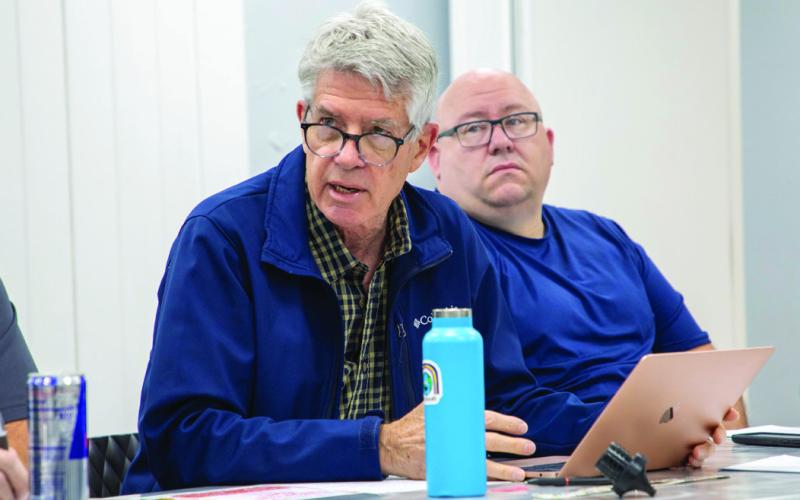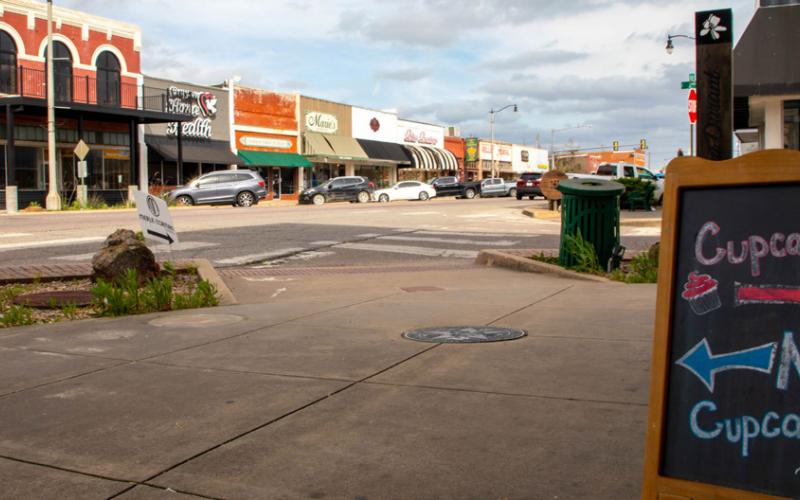A series of Main Street workshops have been set with the goal to improve Main Street from First to 21st avenues.
The theme of part one of the workshops is learn and explore and there will be a meetings at 2 p.m. or 5:30 p.m. April 15 at the Donald W. Reynolds Community Center & Library. These meetings are identical and two times were set to give residents two opportunities to attend.
The second set of meetings will be 2 p.m. or 5:30 p.m. May 6 also at the library. The theme for these meetings will be to discuss and decide.
Mark Mesiti-Miller, chair of Durant Sustainability Coalition, spoke about the upcoming meetings during a recent meeting of the Durant Area Chamber of Commerce Board of Directors.
“We’re inviting everybody here to join us in a conversation about the community and about how we can improve Main Street from First Street to 21st Street,” Mesiti-Miller said.
Kyle Henry, regional transportation planner for the Southern Oklahoma Development Association (SODA), was also present for the chamber meeting. Mesiti-Miller said Henry has been instrumental in helping with moving forward on the project.
“I just wanted to also mention that this workshop is being formed by a national organization called Strong Towns,” Mesiti-Miller said. “Strong Towns has a lot of different campaigns that they are engaged in with developing different communities but they basically advocate for safe, livable and financially resilient communities, focusing on the financially resilient part. I know that will appeal to the business people in this room.”
Mesiti-Miller spoke about Greer, South Carolina.
“About five years or so ago, they invested $12 million in their downtown and their infrastructure,” he said. “Since that time, they’ve had over $200 million reinvested. They’re currently seeking a developer for another $70 million worth of investments. This has been transformative for that community.
“Another one that is even more well studied is because it happened a while ago, about 15 years ago, is the city of Lancaster, California, invested about $11 and a half million dollars. Since that time, they’ve generated over $270 million of economic input, creating 800 jobs nearly doubling their tax revenue.”
Mesiti-Miller said another topic of the workshops will be land use and returns on investments.
“Many communities love big-box stores, but big-box stores do not produce as much revenue as small businesses,” he said. “I’m probably preaching to the choir in this room. Many of you probably know that Oklahoma is one of the few states in the nation that does not pass property tax revenue down to the city so basically, the cities in Oklahoma are mostly starving for revenue. They’re generally dependent upon sales tax.
“Strong Towns was hired by Norman to look at their city so this is very recent data, a couple of years old, comparing a Target, which is generating about $144,000 per acre of revenue, employing about 6.4 people per acre, so we got to put on our ranching and farming hats to understand per acre revenue.
“But Fuzzy’s Tacos, surprisingly, generates $500,000 of revenue per acre and employs about 250 people per acre, so it’s a really dramatic difference and we’d like to encourage a strong town and especially like to encourage small-business investments.”
Mesiti-Miller spoke of the term “stroad.”
“It’s not a street, it’s not a road, it doesn’t do either of those things well, so Durant has a stroad called Main Street,” he said. “If we want to convert it to a street which is something that will generate wealth and provide a place for small businesses to thrive, we have to slow down traffic and put people first. There’s a whole list of things that have to happen.
“We want Main Street to be a road? Great, let’s make it a road. Let’s connect to places, let’s make it a way to get from one place to another and forget about developing small businesses because you really can’t just do both. So how will Durant do this kind of transformation? Durant will do this together. The only way this works is if everybody comes to the table, everybody gets on the same page and everybody gets together and talks about this.”
According to Mesiti-Miller, part two of the meetings will be when everyone rolls up their sleeves. Henry will be providing maps of Main Street which will be studied and participants will decide what kind of Main Street they want. That information will then be communicated to Durant City Council.
Mesiti-Miller said there is a federal grant called Safe Streets for All.
“I’m a civil engineer, retired,” he said. “I spent more than three decades of my life doing public works type stuff as a private consultant. Never in my entire career have I seen a program that will pay you 8o percent of the costs of designing and building.”
Henry said the first phase of the grant is for planning and if that one is approved, the city would be eligible to apply for the construction portion that is highly competitive. However, there are other grants available once the city has a plan.
“If you want to redesign your downtown like Mark’s talking, that’s the way to pay for it,” Henry said.
Mesiti-Miller said that once a city has a plan, the money will come.
“If you can get that plan in place, somehow, someway, the money will flow,” he said. “To give you a sense of what the money would look like, let’s say the City of Durant has $5 million to spend on their Main Street program. Instead of having a $5 million program, you would have a $20 or $25 million program. So, it’s I think worth going for.”
In an email after the chamber meeting, Mesiti-Miller said the team has been developing the program, working on key interactive elements, selecting expert teachings and case studies to share.
“Since the chamber board meeting, I’ve also got some more news on the Safe Streets and Roads for All (SS4A) grant opportunity,” Mesiti-Miller said. “I learned the city council unanimously voted to apply for an SS4A grant and to provide $51,030 in matching funds for completing the required first step: preparing a ‘Comprehensive Safety Action Plan’ during its 6/13/23 meeting. Unfortunately, city staff was unable to meet last summer’s July submittal deadline because a key staff member suffered an unexpected illness. “The City’s SS4A application would have relied on a proposal to develop a ‘Comprehensive Safety Action Plan’ in the amount of $255,150 from Ranuel Ortiz, a local civil engineer. Developing an ‘Action Plan’ is the required first step in unlocking the millions of dollars available through this federal grant program. Such a grant would leverage limited taxpayer dollars by a factor of 5, allowing Durant to actually build much bigger and better projects. For example, $3M in local funds could deliver a $15M project.”
He said Durant is well positioned to received substantial funding and quickly.
“Durant would be remiss to pass up this opportunity to complete the work already authorized and submit an application for SS4A funding ASAP,” Mesiti-Miller said.


